In project management, a program is a set of related projects executed simultaneously by organizations to make the most out of their resources and maximize their return on investment (ROI). Program management requires company-wide collaboration and lots of planning. A program manager oversees this process.
What Is a Program Manager?
A program manager is a leader who oversees the planning, executing and tracking of programs. Program managers do so from a high-level view that allows them to understand how projects fit into their organization, and more importantly how they can be best executed simultaneously.
Program managers usually have project management or business administration background that allows them to align projects with their companies’ strategic goals.
Program managers must also be capable of using project and portfolio management software. ProjectManager is online project management software that offers Gantt charts, kanban boards, task lists and many other program management tools so program managers and their teams can plan, schedule and track work in real time.
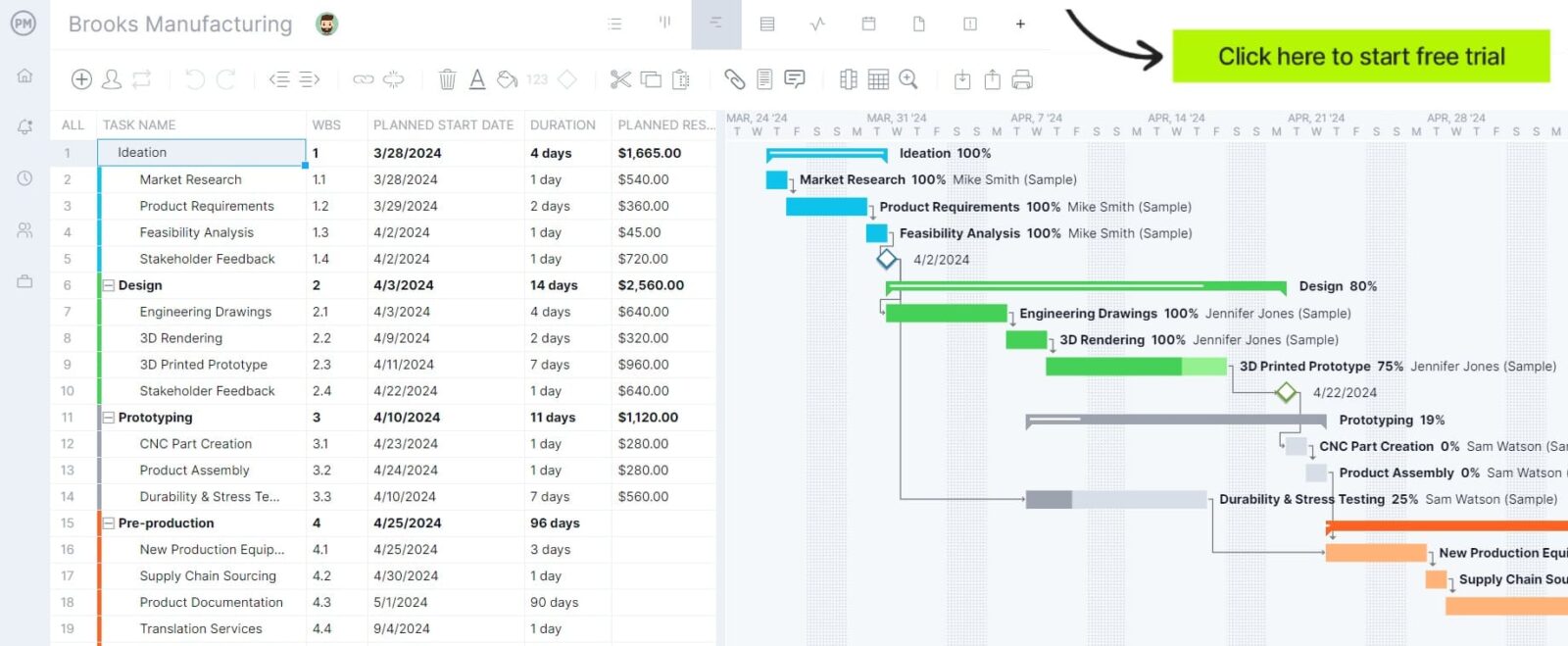
What Does a Program Manager Do?
Program managers must excel at risk management, resource management and project planning, among other things. Another important aspect is that, as it is a leadership role, it involves coordinating multiple teams, project managers and key stakeholders. Here are some of the core responsibilities of a program manager.
Program Manager Job Description Sample
Now let’s review what an average program manager job description looks like. We hope it’s inspiring for you either as an applicant or an employer.
Program Manager Job Description
Looking for a program manager to oversee the fulfillment of larger organizational goals. The right candidate will be able to coordinate activities between multiple projects within the organization to ensure they benefit one another and meet business goals. Main duties include organizing various programs and activities to improve company efficiencies, building long-term goals for the organization and developing program and project budgets.
Program Manager Responsibilities
- Make a program management plan
- Ensure projects and programs are aligned with the strategic plan of the organization
- Define the program controls, or the processes, procedures, reporting, etc., to manage the program
- Plan the overall program and monitor progress to ensure that milestones are being met across various projects and programs
- Make the program budget
- Manage the risks and issues that might arise throughout the program life cycle and take measures to correct them when they occur
- Coordinate the projects and their interdependencies between the various projects and programs in the program
- Manage and use resources across the various projects in the program
- Manage stakeholders who are involved in the program
Program Manager Qualifications and Skills
- Must have strong project management experience with large and complex projects
- Must have a broad knowledge of project management methodologies
- The ability to understand the wider objectives of the program, such as business and strategic goals
- The ability to work with a wide range of individuals
- Strong leadership and managerial skills with appropriate experience
- Strong knowledge of budgeting and resource allocation procedures
Program Manager Education and Certifications
- Certification in Project Management (CAPM)
- Certified ScrumMaster (CSM)
- Program Management Professional (PgMP)
- Portfolio Management Professional (PfMP)
- Agile Certified Practitioner and more
Program Manager Salary
According to Glassdoor, a program manager can earn an annual salary averaging between $164,000 and $243,000.
Program Manager Job Description: In-Depth Analysis
Let’s take a closer look at program managers and what they do. We’ve already outlined a sample job description, but now we’ll get more into the details.
Program Manager Qualifications
One of the most important responsibilities of a program manager is to make sure that all the projects and programs an organization executes are aligned with the goals and objectives that are defined in its strategic plan, which requires a solid understanding of business strategy.
This is why most program manager job descriptions require project management experience, a bachelor’s degree in business administration or related fields and a program management certification specific to your industry. In many cases, a master’s in business administration (MBA) is considered a preferred qualification as it helps in critical areas such as project financial management.
As with any profession, it’s also advisable for you to participate in professional events such as conferences and seminars to stay on top of the program management best practices.
Program Manager Education & Certifications
Program managers need a formal university degree, such as a Bachelor of Business Management or Economics. If the applicant knows the industry they want to go into, then they can pursue a degree in that field, whether it’s engineering, computer science or whatever.
Many employers will also seek a candidate who has certifications as they provide an impartial verification of the person’s ability to perform. There’s a variety of program management certifications that can help you become a program manager and stand out when it comes to hiring and building your career.
It’s up to you to decide what’s the best program management certification for you, which is a decision that greatly depends on the industry and organization for which you’d like to work.
Here are the four of the most common program manager certifications, a great starting point for anyone who wants to become a program manager.
- Program Management Professional (PgMP): This certification program by the Project Management Institute (PMI) validates your knowledge and experience as a program manager. It requires you to demonstrate program management experience or a project management professional (PMP) certification.
- Managing Successful Programmes (MSP): Provided by Axelos, this certification program also validates your knowledge and experience in program management. It’s divided into two levels, MSP foundation, which starts with the fundamentals of program management and MSP Practitioner, a more in-depth training program that builds on the MSP foundation.
- Portfolio Management Professional (PfMP): This national certification from PMI recognizes project portfolio managers with advanced skills and experience. It demonstrates a portfolio manager’s ability to manage and select projects to ensure they align with organizational objectives and strategic initiatives.
- Professional in Business Analysis (PMI-PBA): Certifies that someone is a business analysis expert. Those with a PMI-PBA can gather requirements and develop mission parameters to ensure project success.
Program Manager Responsibilities & Duties
Now, let’s explore in-depth a program manager’s responsibilities and duties. The following is a list of the top requirements.
Select and Prioritize Projects
Project selection and prioritization are processes that help organizations choose and rank projects to maximize their performance and align with objectives. Prioritization involves evaluating projects based on relevant criteria to determine an order of execution. Project selection is choosing the projects that meet that criteria.
Ensure Program Strategic Alignment
Strategic alignment in program management is the process of ensuring projects and initiatives support an organization’s strategic goals. This alignment prevents an organization from wasting resources on projects that do not contribute to its long-term vision.
Make Program Management Plans and Oversee Their Execution
Program managers will work closely with project managers and also with other program managers in a PMO in large corporations as the various projects are planned and executed. This ensures that all the projects are working together to support their shared goals. One useful tool for this is a roadmap that outlines the progress of projects within the program.
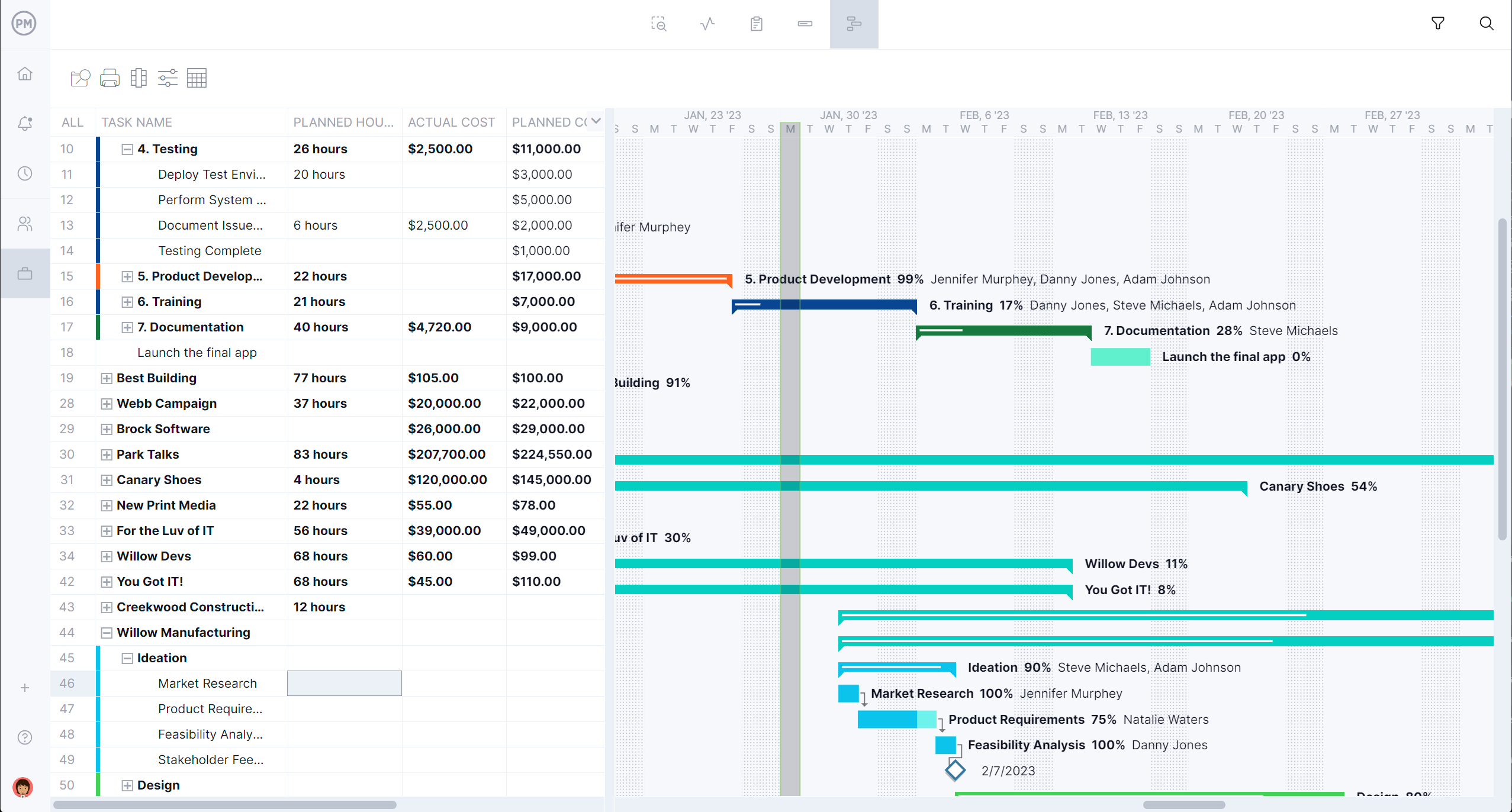
Manage Resources Across Projects
Program managers use resource planning tools to ensure that all the projects in the program have what they need when they need them. This also involves regular scheduling, capacity planning and prioritization with regular monitoring and reporting. A portfolio dashboard is a useful tool for seeing what projects are behind schedule and need attention to stay on track.
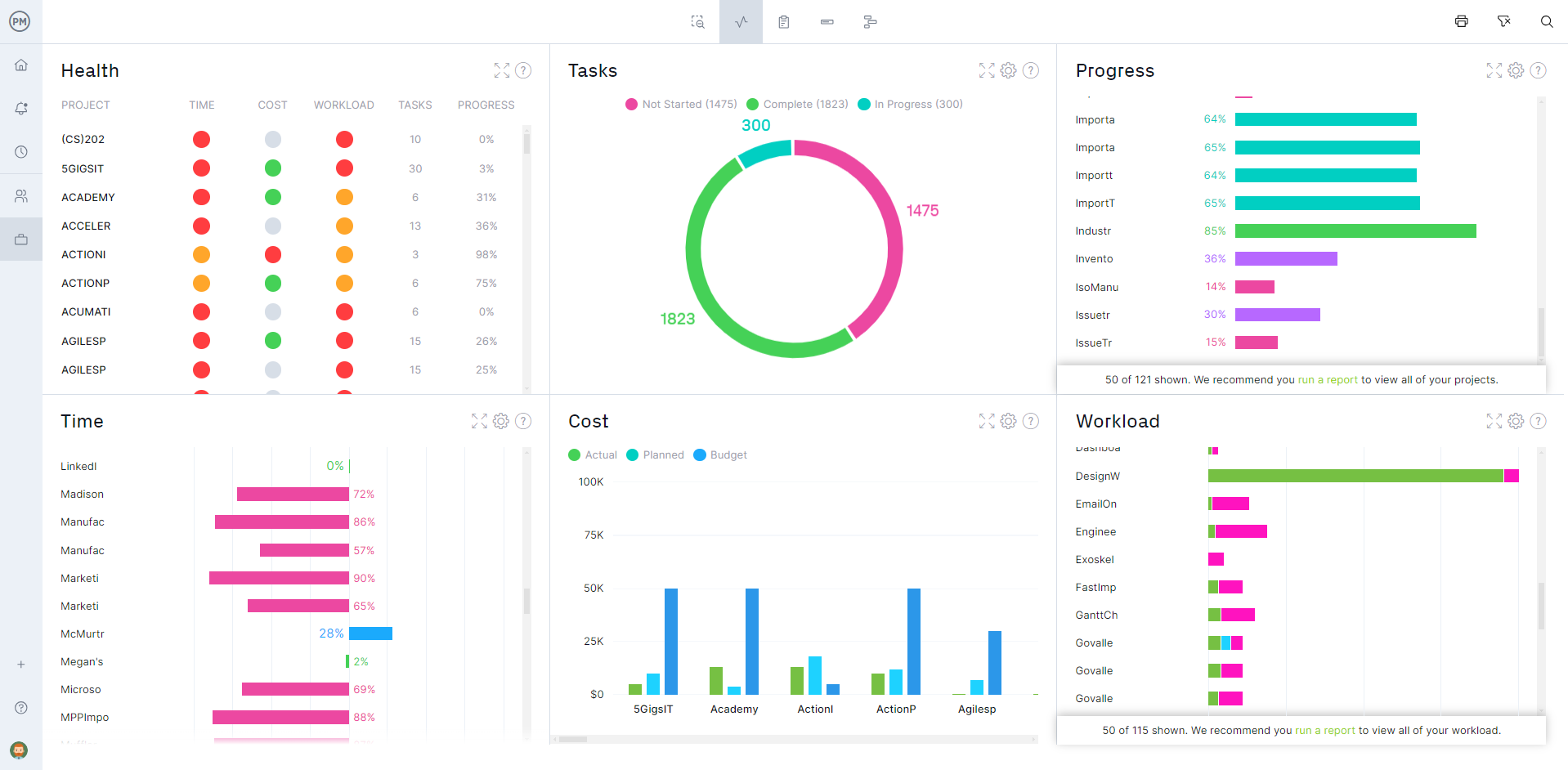
Program Manager Job Description Skills
The qualifications for becoming a program manager include a unique set of hard and soft skills. The hard skills are abilities or knowledge that can be learned by an individual through formal education and training.
Program Manager Hard Skills
- Financial planning
- Project selection and prioritization
- Budgeting and accounting
- Project management
- Business administration
Then, program managers need soft skills or personality traits that will allow them to work collaboratively with others, communicate effectively and reach their goals.
Program Manager Soft Skills
- Leadership
- Time management
- Problem-solving
- Empathy
While they might not seem that important, in some cases, these soft skills will make a difference in the hiring process when choosing between applicants with similar education, training and hard skills.
Program Manager Job Description Examples
There are many different types of program managers. To get a full picture of the scope of what a program manager can do, let’s look at two: technical program manager and senior program manager.
Technical Program Manager Job Description
Job Description
A technical program manager manages all aspects of technical projects for an organization, from conception to completion. They combine technical expertise and project management skills to ensure that projects are executed efficiently and effectively. They often work with engineers to establish product and technology architecture and act as liaisons between engineering teams and business stakeholders.
Responsibilities
- Initiating programs, defining project requirements and generating ideas
- Providing support, negotiating scope and timelines, solving problems
- Driving delivery, managing timelines, budgets and resources to ensure projects are delivered on time
- Identifying enterprise environmental factors that may affect the program
- Establishing technology, tools and processes
- Evaluating the benefits of finished projects, meeting client expectations and ensuring quality assurance
Qualifications
- Strong communication skills
- Proven leadership abilities
- Identify and evaluate risk
- Technical skills
- Industry expertise
- Agile and DevOps practices
Technical Program Manager Salary
According to Salary, the annual salary for a technical program manager is between s$138,000 and $209,000
Senior Program Manager Job Description
Job Description
A senior program manager will be responsible for overseeing and managing multiple complex programs that align with the company’s strategic goals and building the project management maturity of the organization. Works closely with cross-functional teams, stakeholders and senior leadership to ensure success. Has a strong background in program management and a proven track record of driving results.
Responsibilities
- Develop and implement program strategies that align with organizational goals
- Oversee and manage multiple complex projects simultaneously
- Collaborate with cross-functional teams and stakeholders
- Track program progress and performance
- Participate in the project intake process
- Manage budgets, timelines and resources
- Monitor the profitability of the projects in a program
- Identify and mitigate program risks and issues
Qualifications
- Bachelor’s degree in Business Administration, Management or a related field
- Minimum of 10 years of professional experience
- Experience developing organizational process assets
- Proven track record
- Strong leadership and communication skills
- Organizational and time management skills
Senior Program Manager Salary
According to Glassdoor, a senior program manager can expect to make an annual salary of between $156,000 and $249,000.

Program Manager Responsibilities Training Video
Watch this short video, hosted by Jennifer Bridges, PMP, to learn more about the diverse responsibilities of being a program manager.
ProjectManager Is the Ideal Tool for Program Managers
Certification is important to prove your skills, but to manage a program you need program management tools. ProjectManager is online software that helps you manage programs in real time to make more insightful decisions about resource allocation. Our tool has the features you need to keep track of your program.
See All Projects in Your Program in One View
You don’t want to have to keep jumping from one project in your program to another to manage resources, costs and scheduling. Our roadmap is a Gantt chart that shows the timelines for every project in your program in one place. Now you can make educated decisions on how to allocate resources to maximize productivity across your entire program.
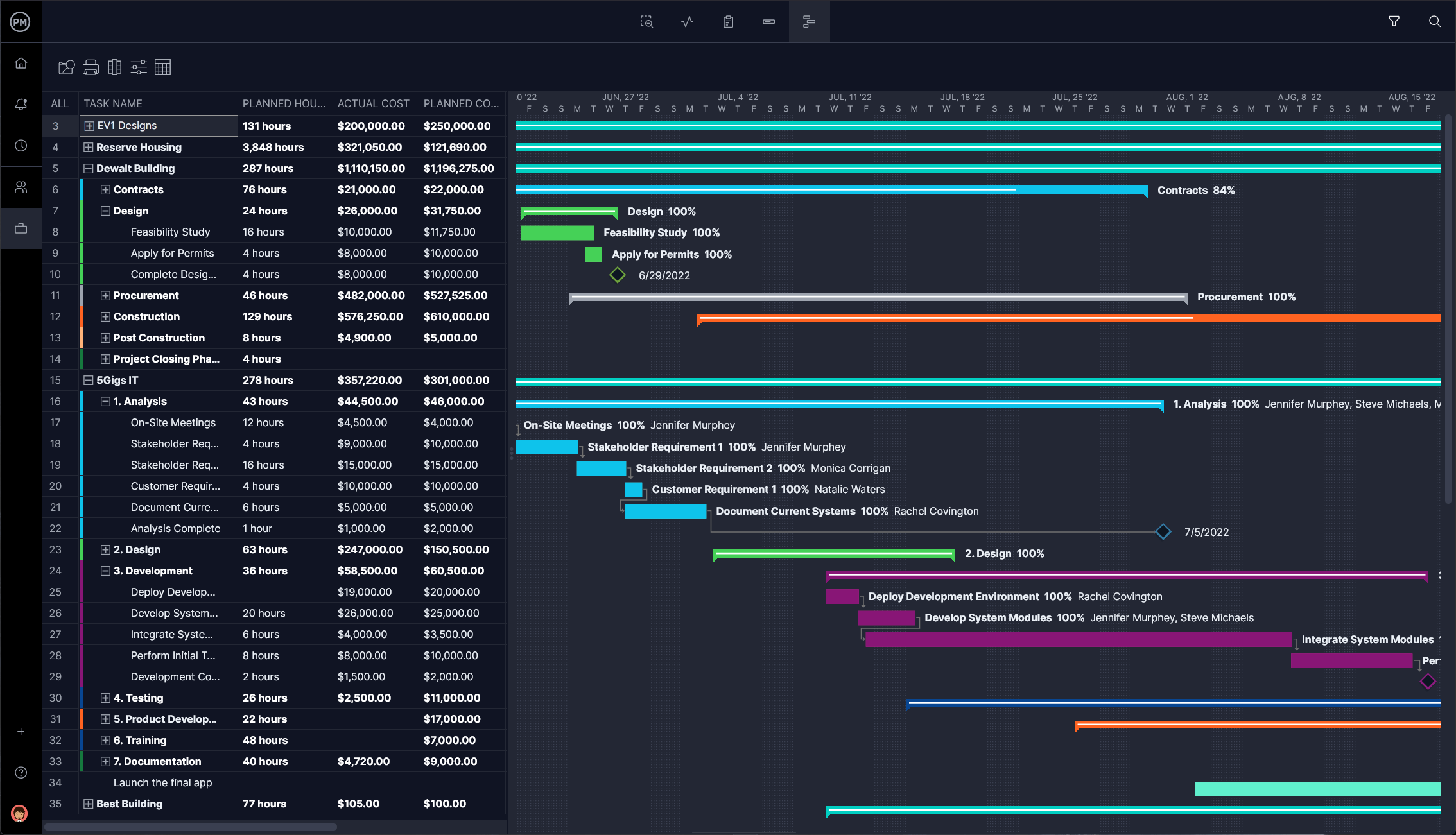
Get a Real-Time Overview of Your Program
A high-level view of your program gives you valuable insights at a glance. See how many work teams have come up and get fast access to important program data on our portfolio summary. You’ll see what’s in the pipeline, budget data, a breakdown of the projects in your program and even a snapshot of your teams’ utilization to help you manage resources and scheduling.
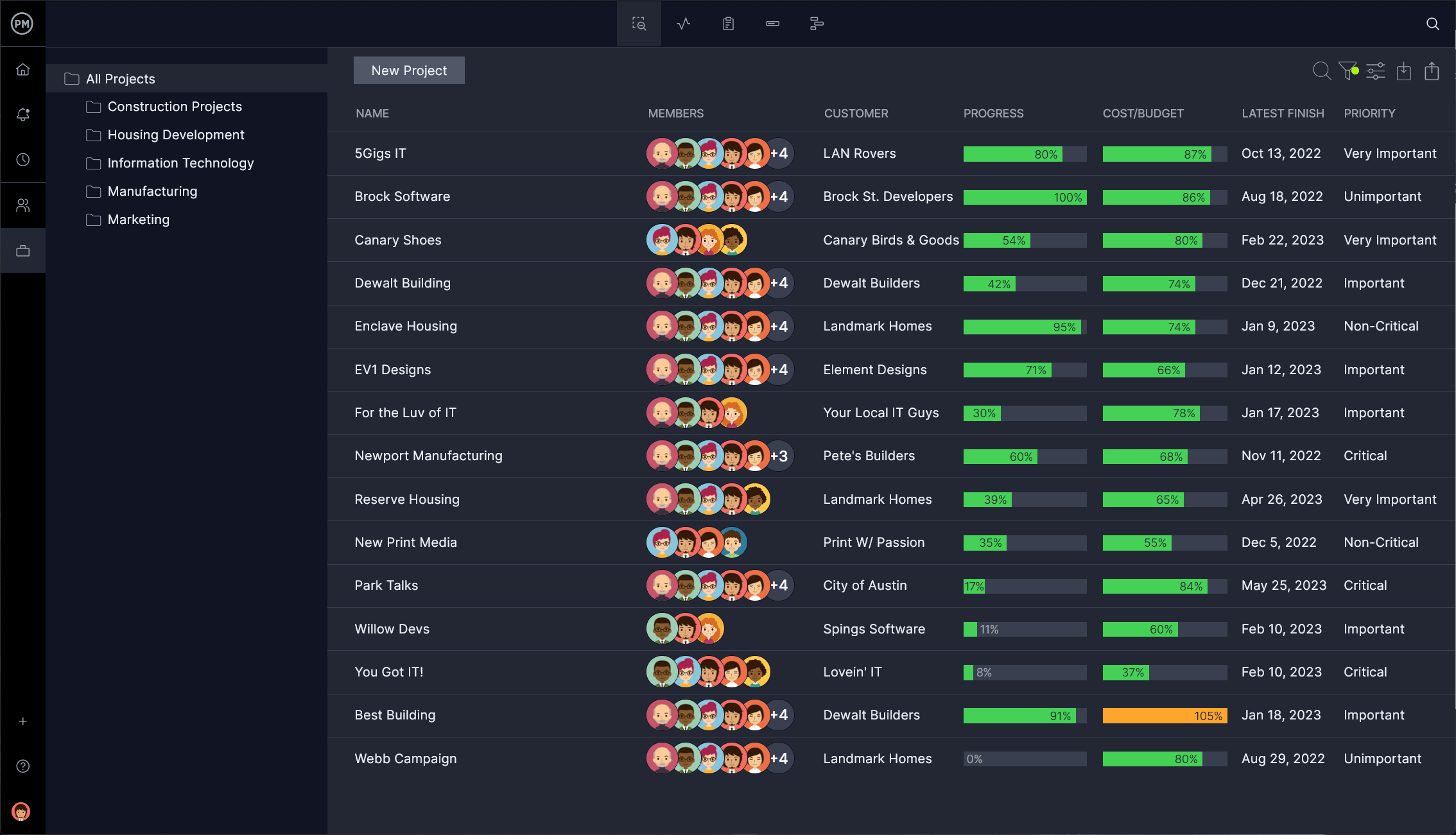
Related Program Management Content
- Project Portfolio Management Guide
- Free PMO Templates for Excel and Word
- Project Selection: Use These 8 Selection Methods for Better Strategic Results
- Project Prioritization Matrix Template
- Multiple Project Tracking Template
- How to Make a Program Management Plan
As you can see, it can get complex. If you need a tool to help you manage your program, then sign up for our software now at ProjectManager.
ProjectManager is award-winning software that helps program managers plan, schedule and track project costs, duration and more. We have unlimited file storage that allows program managers to also use our tool as a centralized hub for all project documentation. Task management features keep you on track and timesheets help you track the time your team spends on tasks. Get started with ProjectManager today for free.

